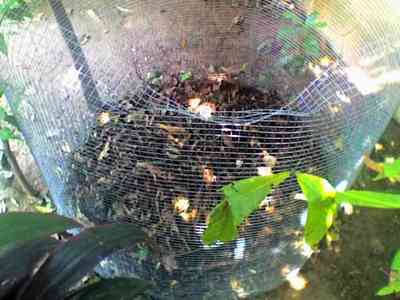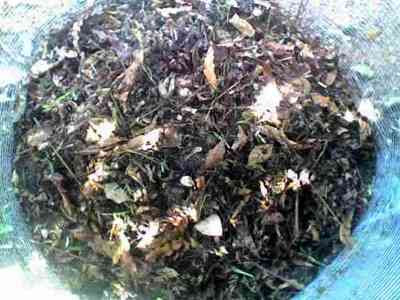My apologies for not posting pictures for this. I’m cut off my my camera for the moment :( .
For the past few days I’ve been brooding over creating my own compost. The horticultural society sells it for Rs. 15 a packet and though it’s not too far, I don’t feel like cycling over regularly. More importantly, I want to be self sufficient and since our place has the space and the resources, I thought it would make a lot of sense for me to do this on my own.
None of the videos and sites on the Internet relating to compost deal with Chennai, or India for that matter. But I learned that the basics are the same. Though I was skeptical at first, I found the relevant bacteria are indeed present even in our garden – the heat generated was proof enough. So composting in India is pretty much the same as composting anywhere else in the world.
Following this great video on making compost, I went out and bought 30 sq ft of wire meshing from a hardware store @ Rs. 10/sq ft. For 300 bucks I made a 3 foot x 3 foot x 3 foot enclosure and placed it in an out of the way area in the garden. I went with my caretaker Mani on the bike and he helped me get a good rate for it.

The next step was to get “brown” material high in Carbon. Dried leaves, twigs and shredded old newspapers were easily available. After this, I needed “green” stuff that was still somewhat fresh. These are rich in Nitrogen. Eggshells, potato peels and other kitchen refuse go into the pile.
The “brown” stuff provides carbon and the “green” stuff provides nitrogen. I’ll turn this over daily and water it without getting it so wet that it hampers air circulation. I learned that the pile is going to heat up to 70 degrees!

It’s been a day now since I’ve set up the compost pile, and it’s already getting hot. I turn it over frequently to replenish the oxygen supply and allow the edges to participate in the decomposition. This morning I picked out a handful and it had a fresssssshhh earthy smell :) I wish I could post smells here so others could get an idea of how good it was. It’s exactly the aroma you get when it begins to rain. Awesome.
Just to clear up a misconception. There is no odor whatsoever with aerobic composting. If anything, the smell is of clean fresh earth. Anaerobic composting however, does indeed smell bad. And that happens when there’s not enough oxygen. With aerobic composting, the by product is carbon dioxide. Anaerobic composting generates methane hydrogen sulfide and ammonia instead. Hence the stink. We also need to get the carbon/nitrogen proportion right. Too much of green fresh stuff and it’ll begin to rot and smell.
It feels very right doing this. Looks like composting in India is easy. It’s an outlet for all the kitchen waste except for lime, egg yolk and dairy products (those attract rodents, and acidic lime kill bacteria) Recycling at its very best! And it costs virtually nothing and gives me the black gold I need for my plants.
How are your tomato saplings?
In reply to Sraboney
They’re doing great! It’s been a month since I first planted the seeds. I only wish I could take a picture of them and post it up – but non poss I’m afraid :(
I have never succeeded in growing anything, though I love plants and trees … and still I find these posts very interesting :)
Vermiculture Pits were compulsory in all societies in Pune (one also earned rebate in property tax) but they did smell a little… I think because we added everything, egg shells, dairy wastes and plenty of greens vegetable peels.
I am envying you the nice fresssshhh smell :)
In reply to Indian Homemaker
IHM, that's a very interesting piece of info about Pune. I notice you said "were", so it's not like that anymore?
I've been thinking of vermiculture myself, but don't know where to get the worms. Most of the videos and articles on the net don't deal with Indian conditions and Indian worms, so I really have no idea is this regard…
Bhagwad I am in Delhi now, but the vermiculture pit in our society is still stinking and producing all the nutrition needed for all the plants in the Society – I am told :) I had taken some pictures too, because a good number of birds and some cats lingered there, I guess the birds found the worms interesting and the cats followed the birds. :)
I think we had bought worms, they were available in the market. I am sure they will be available in Chennai also.
In reply to Indian Homemaker
You know I've often wished that people in India put their experiences on the web as much as people in the US do. For example, there are so many US based sites that talk about vermiculture, but hardly any good India based ones even though it obviously happens.
Thanks for the info. I'll try and do some vermiculture stuff when I get more confidence :)
That’s interesting. I am no expert, but my mom makes something called eru kuzhi at our home. She digs holes 2 feet deep (and around 50 cm diameter). She puts all our vegetables wastes and fruit peels into it and closes the hole once it is full. She says it brings the nutrients back to the soil in the long term. Makes sense since it is our permanent home :)
In reply to vandana
Yup – that’s called anerobic composting where the waste is closed away. Bacteria that don’t require oxygen to survive begin to thrive and in a year or so it all becomes manure. The advantage of this type of composting is that it doesn’t require any management – just seal away and forget it. The disadvantage is that it takes a long time and smells really bad if there’s a leak :)
BTW, can you tell me where we can buy compost in chennai? We live in medavakkam.
In reply to vandana
I buy it in the Agri Horticultural Society Gardens. It’s 23 km from Medavakkam via the old Mahabalipuram road. I’m sure there are other places which are more close by to your house though…
Thanks Bhagwad! I’ll try this place
Hi, we are facing this daily problem of leaves falling into our compound from adjacent property where they have huge trees and the maid is finding it difficult to handle them. We were planning to axe the branches which falls on our side of the property however do not have the heart to cut them as it provides with the much needed shade. Please can you suggest a way to vermi compost them??